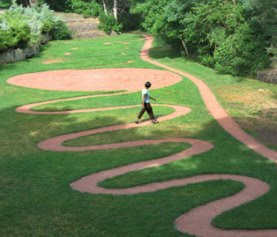 The reason we practice is not seen on the meditation cushion, but in the rest of our life. We practice so that we can better accept the present moment, where our life actually is, rather than always imposing conditions: it must be this way or that way, or we can’t be happy. These conditions can lead us to look elsewhere for happiness, and not realize that the all we need is already in our lives right now.
The reason we practice is not seen on the meditation cushion, but in the rest of our life. We practice so that we can better accept the present moment, where our life actually is, rather than always imposing conditions: it must be this way or that way, or we can’t be happy. These conditions can lead us to look elsewhere for happiness, and not realize that the all we need is already in our lives right now. As we sit we notice that the mind has a lot of different ways to avoid just being in the present moment. One of them is to compare. It compares this sitting moment - "boring" to other moments we could be having - "much more interesting, much more productive". And this habit of comparing extends to our life in general. We compare our present self to a better self, or our lives to others' lives, or to the ideal portrayal of lives which we find in society or which our insecurities about ourselves have generated. We find that a lot of our anxieties arise because we are trying to match up to what we think our life "should" be like, or what others portray as being happy. We are continualy presented with a model of success in career and in relationships which seems so desirable. Often other people seem to have gotten it all together and have all the answers, when we find ourselves feeling frantic, or worried or uncertain inside. Thus we fall into the trap of comparing "our insides to other peoples' outsides" and we find that we come up lacking.
Comparing can lead us to feeling divided and unhappy, pulled in different directions. It manifests itself as a restlessness and unease because it does not allow us rest in what is here, now. This restlessness comes from the fundamental cognitive dissonance or tension that arises when we are caught between wanting two different things. The dissonance caused by such contradictions creates a tension in the mind, which can range from minor irritation to deep anguish as long as it continues.
As humans we try to reduce our anxiety by stabilizing our life and looking for certainty as much as possible. We also do not like holding opposite ideas. Thus we try to convince ourselves that we are consistent and coherent. We need to reduce dissonance in order to maintain our positive self-image and feel good about what we are doing One way to do this is to deny one direction completely. However, such strategies do not tend to work and our deep sense of anxiety remains.
Mindfulness helps us because it allows us see the different ways we try to escape from our life as it actually is. It allows us relax by teaching us that happiness is to be found in how we are, not how our comparing thoughts tell us how we should be. We see them as thoughts, and like all thoughts they increasingly lose their solidity, become more transparent and we do not need to follow them


